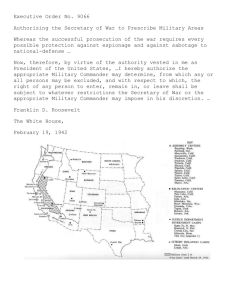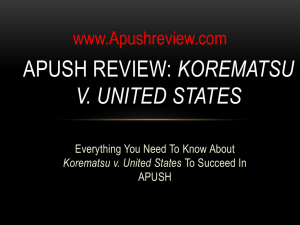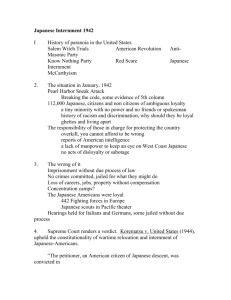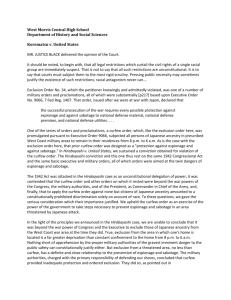Korematsu v
advertisement
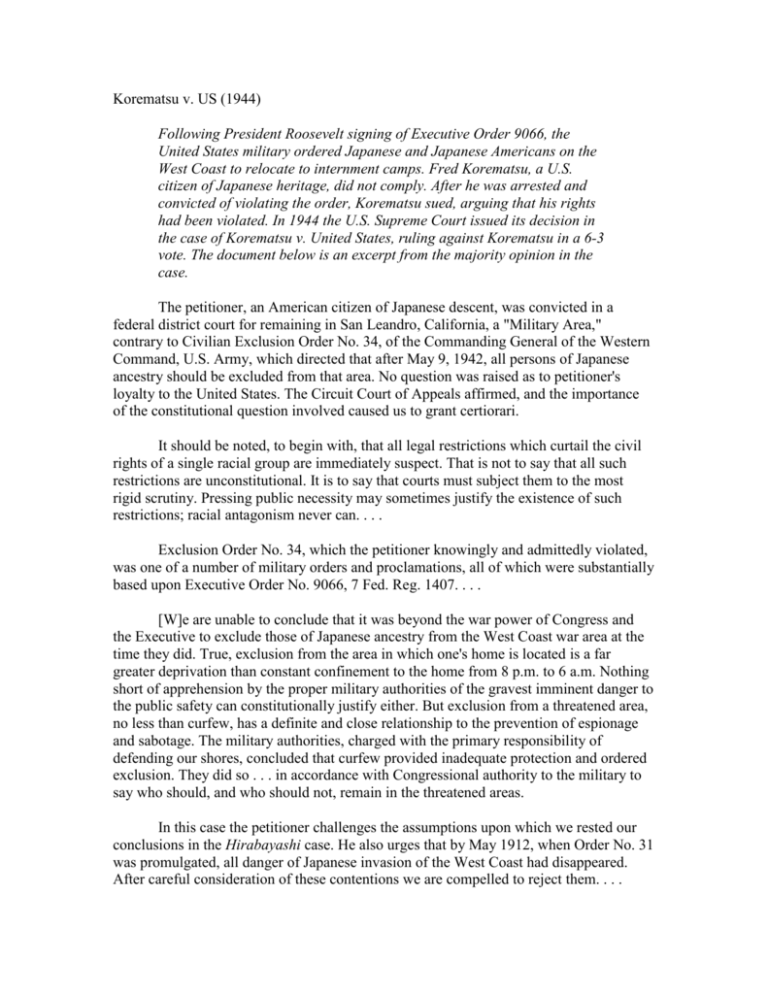
Korematsu v. US (1944) Following President Roosevelt signing of Executive Order 9066, the United States military ordered Japanese and Japanese Americans on the West Coast to relocate to internment camps. Fred Korematsu, a U.S. citizen of Japanese heritage, did not comply. After he was arrested and convicted of violating the order, Korematsu sued, arguing that his rights had been violated. In 1944 the U.S. Supreme Court issued its decision in the case of Korematsu v. United States, ruling against Korematsu in a 6-3 vote. The document below is an excerpt from the majority opinion in the case. The petitioner, an American citizen of Japanese descent, was convicted in a federal district court for remaining in San Leandro, California, a "Military Area," contrary to Civilian Exclusion Order No. 34, of the Commanding General of the Western Command, U.S. Army, which directed that after May 9, 1942, all persons of Japanese ancestry should be excluded from that area. No question was raised as to petitioner's loyalty to the United States. The Circuit Court of Appeals affirmed, and the importance of the constitutional question involved caused us to grant certiorari. It should be noted, to begin with, that all legal restrictions which curtail the civil rights of a single racial group are immediately suspect. That is not to say that all such restrictions are unconstitutional. It is to say that courts must subject them to the most rigid scrutiny. Pressing public necessity may sometimes justify the existence of such restrictions; racial antagonism never can. . . . Exclusion Order No. 34, which the petitioner knowingly and admittedly violated, was one of a number of military orders and proclamations, all of which were substantially based upon Executive Order No. 9066, 7 Fed. Reg. 1407. . . . [W]e are unable to conclude that it was beyond the war power of Congress and the Executive to exclude those of Japanese ancestry from the West Coast war area at the time they did. True, exclusion from the area in which one's home is located is a far greater deprivation than constant confinement to the home from 8 p.m. to 6 a.m. Nothing short of apprehension by the proper military authorities of the gravest imminent danger to the public safety can constitutionally justify either. But exclusion from a threatened area, no less than curfew, has a definite and close relationship to the prevention of espionage and sabotage. The military authorities, charged with the primary responsibility of defending our shores, concluded that curfew provided inadequate protection and ordered exclusion. They did so . . . in accordance with Congressional authority to the military to say who should, and who should not, remain in the threatened areas. In this case the petitioner challenges the assumptions upon which we rested our conclusions in the Hirabayashi case. He also urges that by May 1912, when Order No. 31 was promulgated, all danger of Japanese invasion of the West Coast had disappeared. After careful consideration of these contentions we are compelled to reject them. . . . [E]xclusion of those of Japanese origin was deemed necessary because of the presence of an unascertained number of disloyal members of the group, most of whom we have no doubt were loyal to this country. It was because we could not reject the finding of the military authorities that it was impossible to bring about an immediate segregation of the disloyal from the loyal that we sustained the validity of the curfew order as applying to the whole group. In the instant case, temporary exclusion of the entire group was rested by the military on the same ground. The judgment that exclusion of the whole group was for the same reason a military imperative answers the contention that the exclusion was in the nature of group punishment based on antagonism to those of Japanese origin. That there were members of the group who retained loyalties to Japan has been confirmed by investigations made subsequent to the exclusion. Approximately five thousand American citizens of Japanese ancestry refused to swear unqualified allegiance to the United States and to renounce allegiance to the Japanese Emperor, and several thousand evacuees requested repatriation to Japan. We uphold the exclusion order as of the time it was made and when the petitioner violated it. . . . In doing so, we are not unmindful of the hardships imposed by it upon a large group of American citizens. . . . But hardships are part of war, and war is an aggregation of hardships. All citizens alike, both in and out of uniform, feel the impact of war in greater or lesser measure. Citizenship has its responsibilities as well as its privileges, and in time of war the burden is always heavier. Compulsory exclusion of large groups of citizens from their homes, except under circumstances of direst emergency and peril, is inconsistent with our basic governmental institutions. But when under conditions of modern warfare our shores are threatened by hostile forces, the power to protect must be commensurate with the threatened danger. . . . After May 3, 1942, the date of Exclusion Order No. 34, Korematsu was under compulsion to leave the area not as he would choose but via an Assembly Center. The Assembly Center was conceived as a part of the machinery for group evacuation. The power to exclude includes the power to do it by force if necessary. And any forcible measure must necessarily entail some degree of detention or restraint whatever method of removal is selected. But whichever view is taken, it results in holding that the order under which petitioner was convicted was valid. It is said that we are dealing here with the case of imprisonment of a citizen in a concentration camp solely because of his ancestry, without evidence or inquiry concerning his loyalty and good disposition towards the United States. Our task would be simple, our duty clear, were this a case involving the imprisonment of a loyal citizen in a concentration camp because of racial prejudice. Regardless of the true nature of the assembly and relocation centers—and we deem it unjustifiable to call them concentration camps with all the ugly connotations that term implies—we are dealing specifically: with nothing but an exclusion order. To cast this case into outlines of racial prejudice, without reference to the real military dangers which were presented, merely confuses the issue. Korematsu was not excluded from the Military Area because of hostility to him or his race. He was excluded because we are at war with the Japanese Empire, because the properly constituted military authorities feared an invasion of our West Coast and felt constrained to take proper security measures, because they decided that the military urgency of the situation demanded that all citizens of Japanese ancestry be segregated from the West Coast temporarily and finally, because Congress, reposing its confidence in this time of war in our military leaders—as inevitably it must—determined that they should have the power to do just this. There was evidence of disloyalty on the part of some, the military authorities considered that the need for action was great and time was short. We cannot—by availing ourselves of the calm perspective of hindsight—now say that at that time these actions were unjustified. Question 1: What argument did the government make regarding the necessity of relocating the Japanese and Japanese Americans? Question 2: Under what circumstances did the court find the "compulsory exclusion of large groups of citizens" to be constitutional? Question 3: How does the court ruling deal with the issue of racial prejudice as a factor in the Korematsu case?
